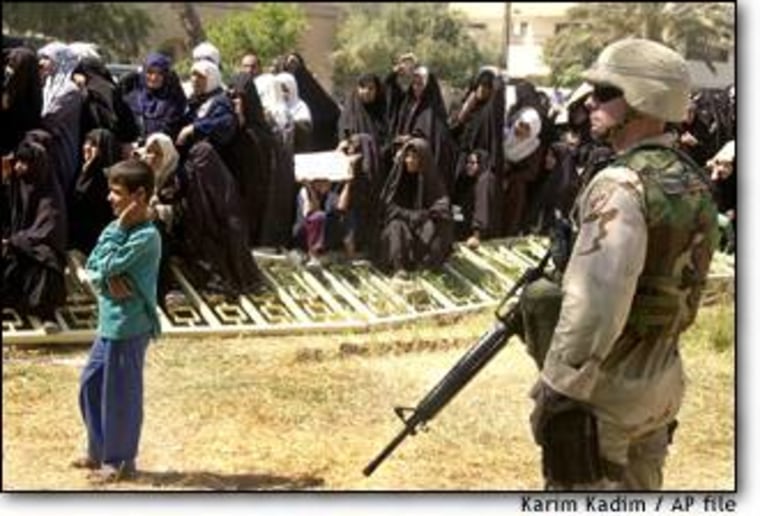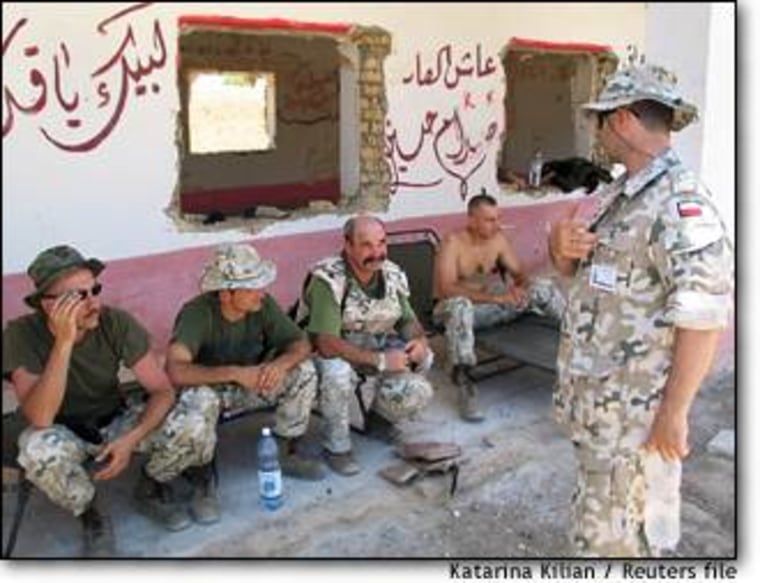Before the Iraq war, the Peacekeeping Institute at the U.S. Army War College in Carlisle, Pa., was just one more vestige of the Clinton years that Donald Rumsfeld intended to consign to the dustbin of history. Now, with U.S. forces stretched thin in Iraq, Afghanistan and elsewhere, the peacekeeping institute has received a reprieve of its Oct. 1 death sentence, MSNBC.com has learned, reflecting a grudging conclusion by the Bush administration that the “p” word, as peacekeeping is sometimes called at the Pentagon, may not be as incompatible with the American military as its civilian leaders thought.
The Peacekeeping Institute, which began operations in 1993 after the debacle in Somalia, sought to study how U.S. troops fared when sent in to do “operations other than combat,” a more formal Pentagon euphemism for peacekeeping.
“After each, the U.S. military applied the lessons, and by the time Kosovo rolled around — I won’t say they were good at it, but we had gotten better,” says James Dobbins, who recently finished his work as President Bush’s first envoy to post-Taliban Afghanistan.
So far, the U.S. Army Peacekeeping Institute‘s Web site still says it will “cease operations effective 30 September 2003.” However, MSNBC.com has confirmed that a senior review by Army and Pentagon officials has reversed that decision. “It kicked up a great deal of opposition, in Congress and in some parts of the military, too,” a U.S. military officer told MSNBC.com, requesting anonymity. “The timing was especially bad with what’s going on in Iraq.”
On Tuesday, an announcement that the institute would continue operations appeared on the war college site, stating that “the capabilities of the U.S. Army Peacekeeping Institute (PKI) will be retained at the U.S. Army War College.”
The spokeswoman, Carol Kerr, confirmed that “something’s going on” but refused to discuss details. She said the announcement had been posted prematurely and, within hours of MSNBC.com’s inquiries, the Army had removed it from the site.
Nonetheless, the full text of the excised statement said: “Following an Army senior leadership review, the capabilities of the U.S. Army Peacekeeping Institute (PKI) will be retained at the U.S. Army War College. The review determined that while the capabilities of the former PKI continue to be important to the Army, they are by themselves insufficient to address fully all aspects of stabilization missions such as those currently ongoing in Afghanistan and Iraq. Accordingly, the original PKI charter and structure are being adjusted in order to meet the full needs of the U.S. Army and the U.S. military in the coming years across a broad range of peacekeeping and stability operations. After restructuring, the organization will be renamed, most likely as the U.S. Army Peacekeeping and Stability Operations Institute (PKSOI). The URL for the PKSOI’s specific web presence will be announced once it becomes active.”
“This is really a deathbed reprieve,” Dobbins says. “I think that the administration has been reluctant to take a serious look at, and acknowledge the gains that were made, in the 1990s in America’s peacekeeping performance. .. They rejected those lessons and the experience outright, rather than looking at what happened and saying, ‘well, this worked, this didn’t.’”
The institute never enjoyed broad support in the Army, which traditionally has regarded peacekeeping as something that should be reserved for less capable allied forces.
As Condoleeza Rice put it during the Bush presidential campaign in May 2000, “the military is a special instrument. It is lethal and it is meant to be. It is not a civilian police force. It is not a political referee. And it is most certainly not designed to build a civilian society.”
On-the-job training
In practice, however, the administration’s insistence on operating outside of the established peacekeeping institutions — the United Nations, NATO and a handful of others — has exposed the flaw in that theory. The same American forces that fought the Iraq war and which Saddam’s propaganda machine vilified for a decade as the enemies of Iraq and dupes of Israel are having a very hard time presenting themselves as liberators now that the major combat is over.

The Bush administration denies that its decision to seek a United Nations blessing for an expanded international peacekeeping force in Iraq amounts to a sudden embrace of the “p” word. White House spokesman Scott McClellen made a point on Tuesday to “disagree with the premise,” noting that U.N. participation in post-war Iraq was envisioned all along.
That is broadly true, though the U.N. role envisioned before the war differed enormously depending on whom in the administration was asked. Given the Security Council’s opposition to the Anglo-American timetable for war, it is hardly surprising that no one wanted to go back and ask the U.N. to bless the occupation, much less put the effort under the U.N. flag.
As late as April 4, Secretary of State Colin Powell said: “We are at the beginning of a process of dialogue, pragmatic dialogue, to determine what the appropriate role of the U.N. should be.” As senior military officers, retired generals and others warned as the combat raged, that uncertainty would come back to haunt American policy, and cost the lives of American troops.
Yet the new tack on peacekeeping goes far beyond the troubled occupation of Iraq. In Afghanistan, too, the need for expanding the current NATO-led peacekeeping force is being recognized in Washington after years of insisting that it confine its operations to the capital, Kabul, and leave the rest of the country open for the 11,000 U.S. forces still in the country to conduct occasional sweeps.
The 5,000-strong International Security Assistance Force there, run by German and Dutch generals, decided recently to expand ISAF’s area of control to include Kandahar in the southeast, perhaps a prelude to a more ambitious expansion.
“The Pentagon civilians thought we could bluff it a bit, like the Brits did during their empire, just show our teeth occasionally and make the capital secure and everything else would fall into place,” says a U.S. military officer who cycles in and out of Afghanistan. “But there are warlords, and there is the Taliban, and there is al-Qaida out there, and heroin traffickers. You have to have peacekeepers in the whole country, or you do not control the whole country.”
Civil issues
Dobbins, Bush’s former top man in Afghanistan, also held senior posts in the U.S. deployments in Bosnia, Kosovo and Haiti. He says the focus on peacekeeping is a good start, but that the debate needs to move beyond military issues. “Military force does no more than open a window of opportunity,” says Dobbins. “It creates the possibility of political and economic change. But the military can’t make that change. It’s civil administrators, people who build political parties, corporations, a free press, a penal system. If you open the window and nothing but the military goes through, then nothing’s accomplished.”
The irony, he says, is that despite the Pentagon’s distaste for peacekeeping, among U.S. agencies it is only the military that has tried to build a database of its experiences in post-war environments. “At State or Treasury or CIA, there’s no standing cadre of administrators or teachers or engineers ready to go in,” he says. The inconsistent performance of the American occupation in Iraq to date may have saved the peacekeeping institute, he says, but nothing so far suggests that anyone is thinking of the long term. “Every time they do a post-war occupation, they do it like it’s the first time, and they also do it like it’s the last time they’ll ever have to do it. We can’t change the mistakes we made of Iraq, but we can try to avoid them in the future.”
